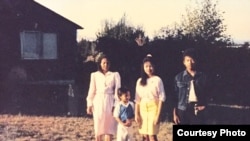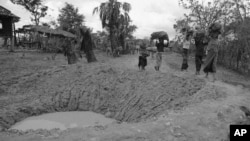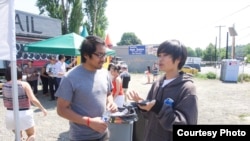For Sameth Mell, this is a good week.
A Cambodian refugee, he learned in May that he had won this year's community voice award for championing social justice, given by the Seattle International Examiner.
Mell, who works to assist Southeast Asian refugee and immigrant communities, will receive the award at a ceremony on Thursday.
The International Examiner, a nonprofit newspaper, and website serving the Asian Pacific islander community has been honoring outstanding Asian leaders across the United States since 1991.
Lexi Potter, a community relations manager at the newspaper, said Mell is being recognized for his deep-rooted commitment to helping those underrepresented in society.
"Sameth is a force to be reckoned with. We deeply admire the dedication, persistence, and spirit he injects into advocacy work," she told VOA Khmer.
Mell said he was surprised by the award, “because, you know, I do this work not because I want to gain this type of recognition."
"It’s a community imperative, it’s a social justice imperative and a personal imperative for me to actually speak up,” said Mell, 34, a resident services manager at Mt. Baker Housing Association, which is dedicated to providing affordable housing in one of the nation’s hottest real estate markets. Price gains for local homes in Seattle were more than twice the national average of 5.8 percent earlier this year.
Like many survivors of the Khmer Rouge genocide that killed 1.7 million Cambodians from 1975 to 1979, Mell’s family fled their homeland seeking refuge from political instability and war.
Born in Thailand’s Kao I Dang refugee camp in 1983, Mell knows poverty firsthand. When he was four years old, he helped his single mother - his father died of leukemia in the camp - feed her five children by going from dumpster to dumpster to collect aluminum cans for redemption.
Mell’s family arrived in Seattle, which has approximately 20,000 residents of Khmer origin, in 1985. For most of his childhood, they relied on state welfare, public housing, and food stamps.
Those were trying times, he recalled. Choking on his words and with tears in his eyes, he said, “I’m getting emotional, 'cause that’s a story that a lot of us might not want to talk about.”
Velma Veloria, a retired Washington State legislator, is the only Filipina to represent Southeast Seattle’s 11th District. She told VOA Khmer that Mell is engaged and looped in with communities and issues across the board.
"He has the right political analysis. He understands people’s places in society and he works to elevate that," she said.
Veloria, who works with Mell at the Coalition of Immigrants, Refugees, and Communities of Color, says Mell's personality makes him a natural-born leader.
"He’s ready and willing to learn," she said. "He’s not afraid to go out on a limb. He’s been really patient, and he’s encompassing and he has access to a lot of different types of group and people."
About 716,000 refugees displaced by war in Cambodia, Laos and Vietnam came to settle in the United States from 1975 to 1985, according to SEARAC.
Mell says Seattle’s large communities of those refugees and their families are in part the consequence of American operations in Cambodia and Laos during the Vietnam War.
Laos and Cambodia were traversed by the Ho Chi Minh Trail, a route communist North Vietnam used to supply guerrillas fighting in South Vietnam.
In Laos, a technically neutral country, the CIA began bombing operations in 1964. Over nine years, the U.S. unloaded 2.5 million tons of bombs on Laos.
In Cambodia, another neutral country, the U.S. dropped 110,000 tons of bombs, a barrage that lasted for over a year, in what was ultimately a vain attempt to stop the supply chain.
“These issues that have happened in the past didn’t happen in silos, and in order for us to progress as a community, we have to recognize that our history did not begin with the Khmer Rouge,” Mell said. “A lot of the stuff that happened was also a part of the impact of U.S foreign policy.
“And that it’s okay to ask the U.S. government – local, state, county, and national - that they need to invest in our communities,” he added.
William Oung, chair of the Cambodian American Community Council in Washington State, says Mell speaks for those who cannot speak for themselves.
"He’s trying to put Cambodian-Americans on the map, working on immigration issues with Philippine and Ethiopian communities, and working on low-incoming housing for the various populations," he said.
Barbara Boyd, 56, a resident of a subsidized housing unit at the Mt. Baker Villager Apartments, says Mell is a veritable resource library for his clients. He provides residents with bus tokens, access to an energy-assistance program and food, so that "we can focus on our other living needs."
Mell elevates the Cambodian-American community to another level, Oung said. "He takes us to the public at large and he bridges the gap."
His next goal, Mell says, is even more visibility for his community: "I want to make sure that other Cambodian-Americans are visible as well. That’s why I helped to build leadership in the Cambodian community."
Former state Representative Velma Veloria has a different vision for her friend’s future: "We need more people like him in the state legislature."











